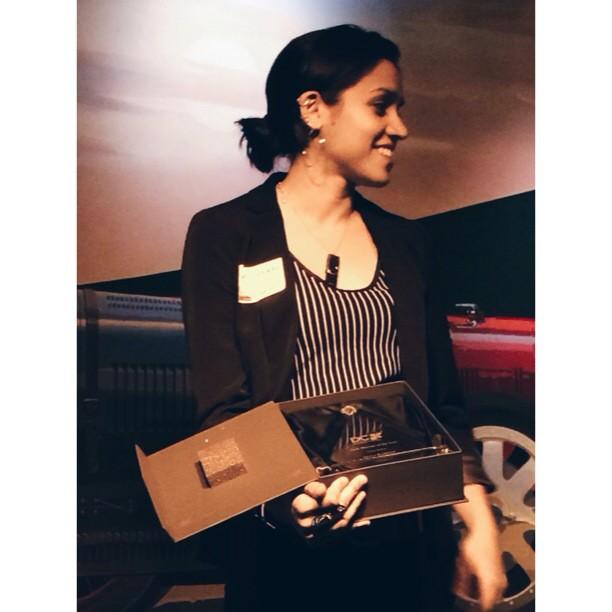Aliya Rahman’s résumé would be hard to classify.
She’s been a bartender, a DJ, a teacher, an academic researcher, a field director and a software developer. Yet, despite the wide range of titles, this 33-year-old Shaw resident’s life has always been angled toward tech.
“I grew up in places that were complete opposites of each other in terms of their rural or urban-ness, but they were similar in that both were home to a lot of very resourceful, very creative poor folks,” Rahman wrote in email interview with Technical.ly DC. “Neither afforded quick or easy access to new tech, electricity, repairs, or media. So I learned to build and repair a lot of things myself, both software and hardware, and that’s really defined my history in tech.”

Now DC Web Women’s first-ever Tech Woman of the Year is starting a new gig at the Open Tech Institute at the New America Foundation. For her two month stay, Rahman is focused on two projects and coding alongside “three apprentices who are all genius women and queer people of color.”
The first project is focused on police body cameras and how to build racial justice and grassroots frameworks into the surrounding policy debate. The second deals with trying out a model of workforce development for local people to accompany fiber network expansion.
Here, Rahman walks Technical.ly through her day, and explains how fiction, mentoring and mechanical keyboards keep her inspired.
###
How do you jump start your day?
I kiss my girlfriend, make a pot of coffee, and read fiction over the course of a cup. This morning was Octavia Butler. Honestly I think tech in the spheres of both design AND policy demands that its practitioners be able to continue imagining new worlds and learning to understand other people’s realities. So, fiction writing is a vital tech tool for me.
What are your email habits? How often do you check and is there any that helps you get to an empty inbox?
My inbox is my to-do list. I answer everyone who writes to me within 48 hours, even if that’s just to say “Hi! I got this and I’m working on it” or ” I appreciate you, but my plate is full this month.” And I send emails to myself so I don’t need a separate task list. I may not clear my inbox at the end of every day, but it usually stays small enough to help me keep the stress of bad communication off my shoulders.
If we did something in a day that shifted a power dynamic, especially if through the leadership of women of color, I sleep well.
What do you spend a majority of your day doing?
Generally, a quarter of my time doing software/hardware work; a quarter reading/writing; a quarter connecting people and asking them to do specific things for each other; a quarter working in a pretty focused way with a few excellent women and queer people of color moving into/through new jobs or projects.
The last one is probably the most important to note, because the first time a reporter asked me to explain what I did in a typical day, it was the only consistent thing I could point to. It extends my hours, but I find that I spend no less than 10 hours a week working to help someone in my crew staff up, prep for a job interview, improve a coding skill, draft a project contract, or find coalition partners. I keep that pretty focused — no more than 3-5 people at a time that I’m really committed to working hard for, and I often turn down cold-call emails or asks for coffee from people who say “I just want to pick your brain” if they don’t have specific asks or we’re not already in the community.
When you need a break, what do you do?
I play music. If I’m not near a guitar or piano, I pretend I am and listen to Spotify.
What gear do you use?
I depend on a hard-shell motorcycle pack that’s pretty vital to the life of someone who carries around lots of tech or changes of clothes (when you live between policymakers and hackerspaces, suits and jeans take turns being inappropriate).
Laptopwise, I work on an Asus Zenbook running Ubuntu. And I use a mechanical keyboard — that’s dramatically changed how my wrists feel about me.
What is your favorite thing on your desk?
Probably that keyboard. Tactile responses all day long.
What is something unique to your work style?
This isn’t unique, but sometimes it’s unusual in the tech space — I spend a LOT of my time engaging with the amazing grassroots leaders of the social justice movement, online or offline, and making sure their voices are credited, compensated, and/or invited at every conceivable step in my work. They are experts. Period. At least half of what I consider to be “news” comes from live tweets from community organizers and activists — things that are very unlikely to hit mainstream news in an unfiltered way yet are speaking truths about the reality in which we’re building policy and tech.
Is there any difference between how you work now and how you used to?
I have a desk now. That’s new.
What’s the marker of a successful work day for you?
If we did something in a day that shifted a power dynamic, especially if through the leadership of women of color, I sleep well.







